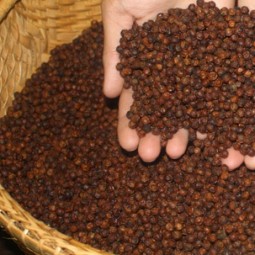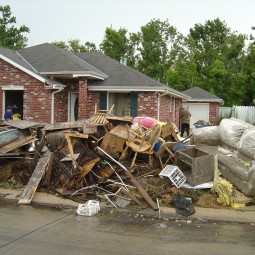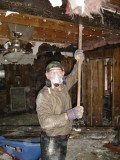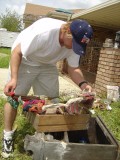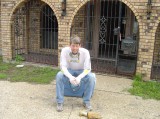My friend and longtime colleague Tom Gordon loves Southeast Asia. He’s showing it by selling a variety of Cambodian products, included prized Kampot pepper, to help free women from the sex. trade. In July 201, Tom recounted how it all came about in the Orange County Register. Here’s the beginning of the first part. Click on the link at the end to read more on the Register’s web site:
I never thought I’d be selling pepper. Or jasmine rice and rose facial scrub. Or damask scarves.
In fact, until I Googled it, I had no idea what damask was.
It has been a crazy year.
Last year on May 13 my wife, Cris, had taken our black Lab, Shadow, out for a walk. While they were waiting at a stoplight on Main Street in west Orange, an SUV made an ill-timed left turn, hitting a small sedan and sending it up on the sidewalk. Cris and Shadow were both hit. Cris somehow got her foot caught under the car before rolling up on the hood. The result was not pretty: a trip to the UCI Trauma Center, six days in the hospital, more than 70 stitches, a compound fracture of her left ankle, a broken right leg and an amputated big toe.
Her recovery was long and slow. Over five months she progressed from bed-ridden to a wheelchair to a walker to crutches to a limp. We had a lot of time to talk and think and we discovered our priorities had changed.
Just a month before the accident we had visited Cambodia. We have been to Southeast Asia many times and Cambodia — a poor nation with a tortured past — touched us most. During our visit we toured a pepper farm in Kampot Province. The pepper was spicy and the farmers were sincere. We asked one farmer what we could do to help. His answer was simple: “Sell our pepper in your country.”
Between visits to the orthopedic clinic at UCI and appointments with home-health nurses, we decided we would give it a try.
Sounds easy enough.
Keep in mind, Cris is an art director at an ad agency and I have been a newspaperman for almost 40 years. What did we know about business licenses, international shipping, customs brokers and Pay Pal?
Not a lot.
Read the entire story about the growth of the Pepper Project here.
Find out more about the Pepper Project and its products here.
Find out more about the Daughters of Cambodia, a faith-based non-Government organization reaching out to victims of sex trafficking in Cambodia, here.
